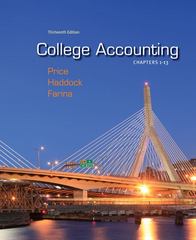Question
It is the usual accountant's story...a friend of yours (John Dough) has purchased a small business and knows that you are proficient at analyzing financial
It is the usual accountant's story...a friend of yours (John Dough) has purchased a small business and knows that you are proficient at analyzing financial information. He has asked you to help him with his financial analysis. He informs you of the following background information:
After 20 years of service at his prior job, John was burned out and considering a change. While Christmas shopping, he was talking with a retail owner at a local mall and was informed that most retail stores mark up their prices 200%. John decided to quit his job and purchase and operate a retail toys and hobby shop. So, after finding the right opportunity, in January of year 1, he purchased a small store and inventory of toys / games for $300,000. He financed the purchase through the local bank, which loaned him 80% of the money at 7% for 10 years and required John to personally finance the other 20%. Since he is the owner of a small business, he has been operating it as a sole proprietor and not issued any stock. He is not paid a salary, but draws money out as needed. He has a full-time bookkeeper who handles all his books and accounting functions. There are two full-time sales clerks that work in the store and stock inventory in storage or on the shelves as it is delivered. All three of these employees have worked for him since he opened his business. John started each of them out at about $25,000 per year and has given each of them raises every year (approximately 3% per year). Additionally, if the company has a good year (net income), he rewards the employees by paying each of them a bonus of 3% of the net income amount. The bonuses are paid in the following year (February).
For years 1 and 2, he hired some external accountants for the compilation report. For years 3, 4 and 5 he hired a different set of external accountants for the compilation reports. The compilation reports state that the books are kept on an accrual basis of accounting according to GAAP and that Property & Equipment is capitalized at cost and depreciated using the straight-line method over the useful life of the property (Equipment 3 years, Furniture 5 years and Buildings 15 years).
Required : List 5 accounts that are suspicious relating to possible irregularities and why you believe additional investigative work should focus on them. Hint: to answer this you need to example the relationship between two accounts, ie. if one account increases what do you expect from the other related account. You should list 5 of such relationships.


Step by Step Solution
There are 3 Steps involved in it
Step: 1

Get Instant Access to Expert-Tailored Solutions
See step-by-step solutions with expert insights and AI powered tools for academic success
Step: 2

Step: 3

Ace Your Homework with AI
Get the answers you need in no time with our AI-driven, step-by-step assistance
Get Started


